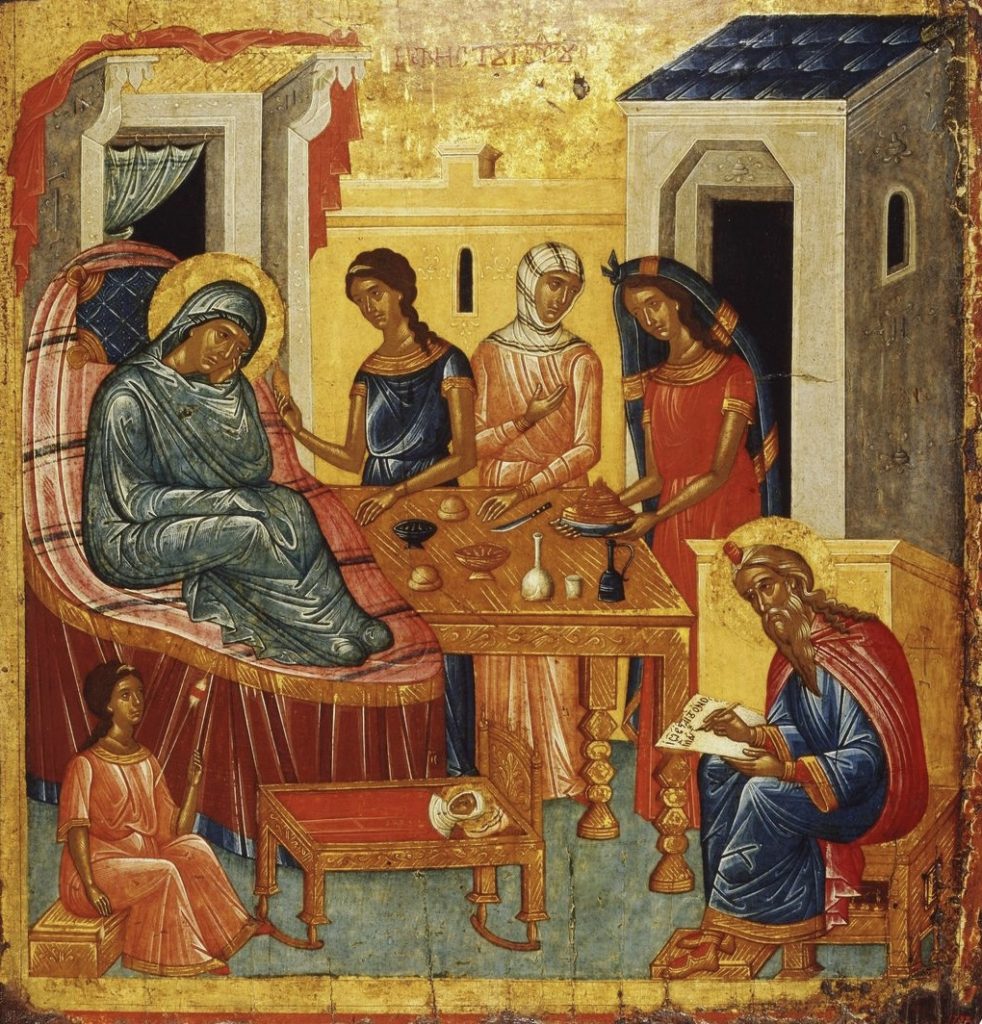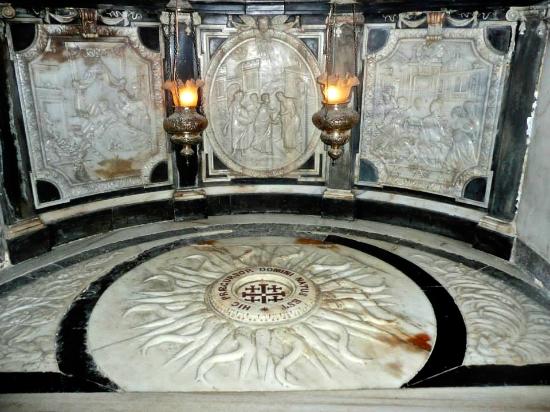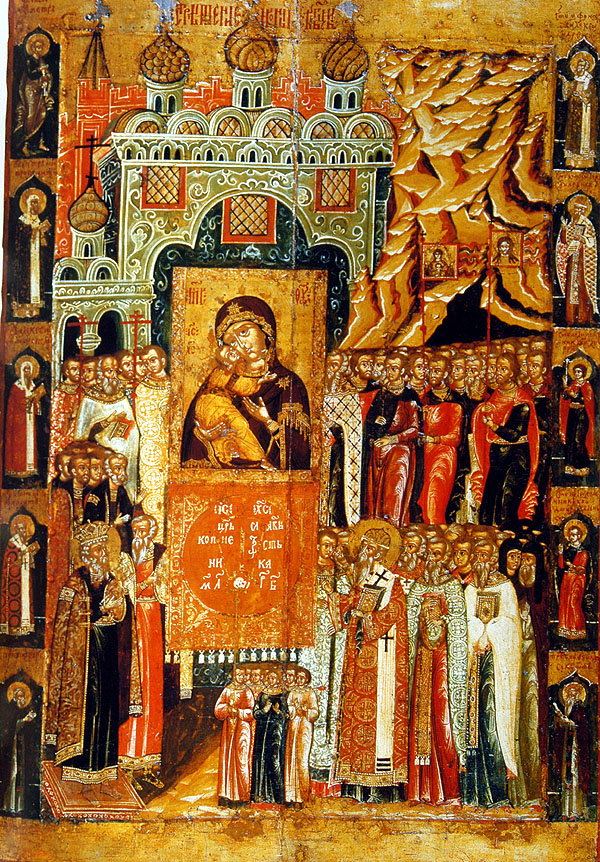Canon: the Lamentation of the Martyred-Tsar, the acrostic whereof is “Take pity, O God, upon Thy sinful people,” in Tone II
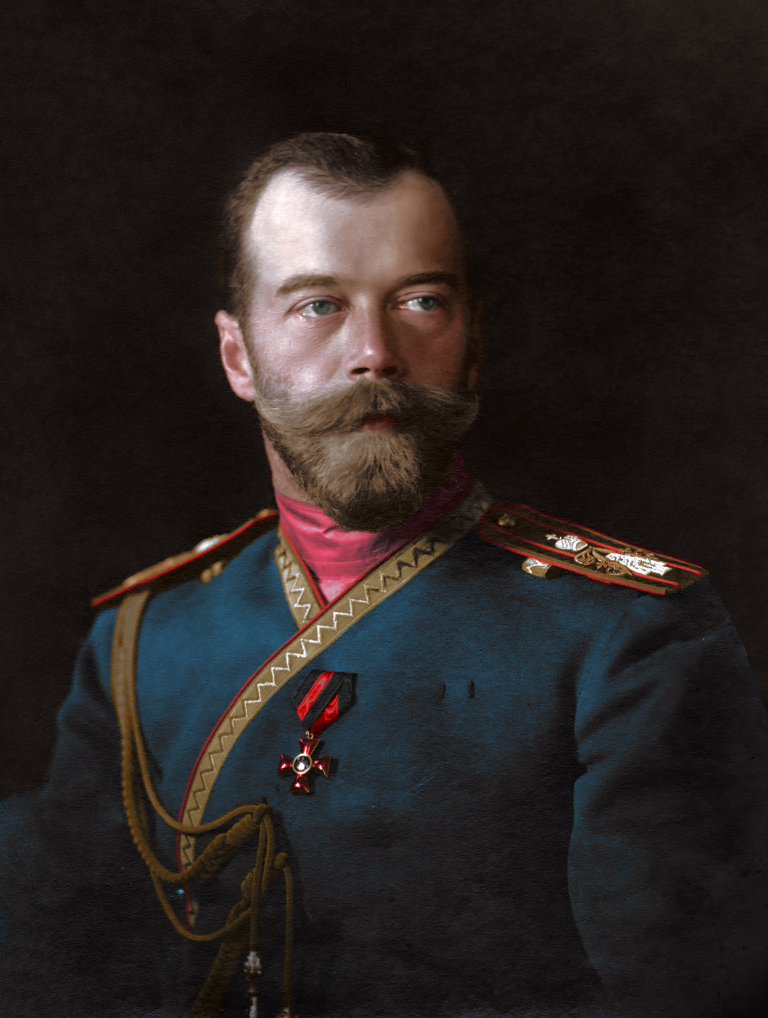
Ode I, Irmos: Come, ye people, let us chant a hymn to Christ God, Who divided the sea and guided the people whom He had led forth from the bondage of Egypt, for He hath been glorified.
Holy Royal Martyrs, pray to God for us.
Beholding the mockery and spoliation of thy land by the godless foe, the pious Tsar wept from the depths of his heart, like the Prophet Jeremiah and the three youths, praying for the sinful people and groaning bitterly: O merciful Lord, forsake us not!
Holy Royal Martyrs, pray to God for us.
O how hath the Russian land, which before was prosperous and glorious in the world, been made captive by those who contend against God? All who were her friends have forsaken her and have become her foes. The Lord hath rejected tsar and prince and priest. Behold, O Lord, look down and have mercy!
Glory be to the Father, and to the Son, and to the Holy Spirit.
Great is the abyss of the Lord’s compassion. The Lord doth not reject us forever, but taketh pity on the humbled and penitent, in accordance with the multitude of His mercies, and He delivereth His people, as of old He delivered Israel from the bondage of Egypt.
Now and ever, and unto the ages of ages. Amen.
O Mistress, hearken unto the cry of prayer of those who with faith and love have recourse to thee and hymn thee with fear.
Ode III, Irmos: Establishing me upon the rock of faith, Thou hast enlarged my mouth against mine enemies, for my spirit doth exult when I chant: There is none holy as our God, and none righteous save Thee, O Lord!
Holy Royal Martyrs, pray to God for us.
At God’s behest, the guardian angel was taken away from the land of Russia, her enemies assumed the rule over it, and they that despise her prosper, because of the multitudes of the impieties of what before was a pious land; and her princes languish among alien peoples. Spurn not utterly Thy suffering people, O Lord, but turn Thou and establish them on the rock of Thy commandments.
Holy Royal Martyrs, pray to God for us.
How long, O Lord, will the way of the wicked prosper? How long will the land weep because of the evil of those who dwell therein? Hierarchs, priests, princes and faithful people have been cast down and slain. How long, O Lord, O true and holy Master, wilt Thou refrain from condemning Thine enemies for their blood? Have mercy and deliver us all from Thine enemies, and save our souls.
Glory be to the Father, and to the Son, and to the Holy Spirit.
Bereft of deliverance, the land which before was called Christian hath been filled with tribulation and groaning, saying amid its suffering: We have sinned and transgressed, falling away from Thee, O Lord, and have not obeyed Thy commandments, nor kept them. Turn us to repentance, O God, and establish us upon the immovable rock of Thy commandments.
Now and ever, and unto the ages of ages. Amen.
Thou art our hope and trust, O all-holy Mistress. Save our suffering homeland and thy people who entreat and call upon thy name.
Lord, have mercy. Lord, have mercy. Lord, have mercy.
Kontakion to the holy martyr Grand-Duchess Elizabeth, Tone IV: Taking up the Cross of Christ, thou didst pass from royal glory to the glory of heaven, praying for thine enemies, O holy martyr Grand-Duchess Elizabeth; and with the martyr Barbara thou didst find everlasting joy. Therefore, pray ye in behalf of our souls.
Sessional hymn, Tone VII: O holy passion-bearer Grand-Duchess Elizabeth, when they cast thee alive into the mine shaft at Alapaevsk, together with the holy martyrs of royal blood, the princes Sergius, John, Constantine, Igor and Vladimir, as well as the martyr Barbara and the holy martyr Theodore, though all were long enfeebled because of their wounds, thou though barely alive, didst alleviate the suffering of the dying, chanting sacred hymns which they that passed by did hear. Wherefore, we beseech thee: Entreat Christ God, that He grant remission of transgressions unto those who celebrate thy holy memory with love.
Glory be to the Father, and to the Son, and to the Holy Spirit; now and ever, and unto the ages of ages. Amen.
Theotokion: When I stand before my Creator on the day of His righteous judgement, then, O Mistress, stand before me and deliver me from everlasting torment, that I may not go down into hades, but may be saved by thine assistance, O all-holy Theotokos.
Ode IV, Irmos: Thou didst come forth from the Virgin, neither a mediator nor an angel, but Thyself incarnate, O Lord, and hast saved me, the whole man; wherefore, I cry to thee: Glory to Thy power, O Lord!
Holy Royal Martyrs, pray to God for us.
The great iniquities of Thy people were before Thine eyes, O Lord; and the godless foe hath defiled and razed Thy sanctuaries, as the Prophet Isaiah said: Your feasts My soul hateth; I will no more pardon your sins; when ye stretch forth your hands to Me, I will turn away Mine eyes from you. These people draw nigh to Me with their mouths, but their heart is far from Me. Mindful thereof, we now repent and turn to Thee, that Thy wrath may cease, and that we may prevail over those who assail us and say: Glory to Thy power, O Lord!
Holy Royal Martyrs, pray to God for us.
O how the time of the iniquities of Thy people hath increased, O Lord, for Thou hast taken away our strength, Thou hast given us into the hands of transgressors and hast made us all slaves. Only Thou alone, O Lord, canst, if Thou wishest, free us, when we acknowledge our sins and turn to Thee, our Creator, and glorify Thee.
Glory be to the Father, and to the Son, and to the Holy Spirit.
Only in God is there blessed life which is everlasting, but narrow is the way which leadeth to that life. Thy people, O Lord, have forgotten these things, and have not obeyed Thy words, O Christ our King, but have taken the wide path of sin. And perdition and violence have come upon us, yea, exile and death, that we may come to acknowledge Thee to be the only true path, O our Saviour, and convert, and glorify Thee.
Now and ever, and unto the ages of ages. Amen.
Thou art our refuge and consolation, O all-pure Theotokos. Beseech thy Son and our God to grant us salvation and the remission of sins.
Ode V, Irmos: O Lord, Bestower of light and Creator of the ages: guide us in the light of Thy commandments, for we know none other God than Thee.
Holy Royal Martyrs, pray to God for us.
When the Lord rejected tsar, prince and priest, He did not spare His temples and holy things, and they were then laid waste. My heart hath been troubled within me; I sigh, but there is none to console me. O Lord, look down and take pity; enlighten us with Thy commandments, that we may turn to Thee and serve Thee.
Holy Royal Martyrs, pray to God for us.
Thy people, O Lord, wished to escape the violence of the foe, but were unable, and others have sojourned among alien peoples. This hath taken place, for false leaders have spoken vain things and foolishness, and have not spoken of sin, to avert the wrath of God, captivity and exile. And now all the lips of our enemies are opened against us, their teeth have gnashed and said: Let us swallow them up! Arise and cry out at night, pouring forth prayer unto the Lord and stretching forth thine hands unto Him, saying: Behold our destruction, O Lord! Enlighten, look upon us, and have mercy!
Glory be to the Father, and to the Son, and to the Holy Spirit.
Youths and virgins, elders and innocent babes have been slain; the enemy hath persecuted my soul; he hath humbled my life to the earth; he hath set me in dark places, like the dead of old, and my soul hath been despondent within me; within me my heart is troubled; but strength hath perished, yet my hope is in the Lord. Be Thou mindful, O Lord, of my poverty and embitterment. These things I spake within my heart; wherefore, I endure suffering from God, that the Lord may regard my humility.
Now and ever, and unto the ages of ages. Amen.
O all-pure Mary, entreat God Whom thou hast borne, that He grant thy servants remission of sins.
Ode VI, Irmos: Stuck fast am I in the abyss of sin, O Saviour, and tempest-tossed on the deep of life; yet lead me up from the passions and save me, as Thou didst Jonah from the sea monster.
Holy Royal Martyrs, pray to God for us.
The Lord hath granted consolation, for the mercy of the Lord hath not forsaken us and His compassion hath not ended; for they are renewed with each passing day. Wherefore, let us trust in God; the Lord is our portion, let us hope in Him Who is able to deliver us from all misfortunes, as He did Jonah from the sea monster.
Holy Royal Martyrs, pray to God for us.
It is a good thing to seek God, for the Lord is good to those who trust in Him, and good it is for the soul which awaiteth in patience the salvation of God, who giveth his face to the smiter and accepteth abuse, that the Lord not utterly reject it, but deliver from destruction the souls of the humble who trust in Him.
Glory be to the Father, and to the Son, and to the Holy Spirit.
The Lord hath sent woe upon sinful people, but He hath mercy according to His great goodness and love in His care, for He hath smitten and rendered bitter the lot of the children of men not out of the volition of His heart, but when they trampled upon His commandments; for from the Most High come punishment and prosperity alike. Let not every mortal complain concerning his chastisement, but let his face be downcast because of his sins and let him lament until he sinketh down in death and beholdeth the Lord from heaven.
Now and ever, and unto the ages of ages. Amen.
Now do I flee unto thee, O all-pure one. Save me by thy supplications, and preserve me; for what thou wishest, thou canst do, as thou art the Mother of the Almighty.
Lord, have mercy. Lord, have mercy. Lord, have mercy.
Glory be to the Father, and to the Son, and to the Holy Spirit; now and ever, and unto the ages of ages. Amen.
Kontakion, Tone VI: Thou didst strengthen the hope of the martyred Tsar, his Tsaritsa and children, and it took flight to Thy love, proclaiming beforehand their future rest. Through their supplications, O Lord, have mercy upon us.
Ikos: Beholding the faith of Christ made mighty throughout the land of Russia by the pious Tsar, and unable to endure it, the enemies of God pondered how they might destroy the Christ-loving Tsar-martyr Nicholas, and they gave him over to an undeserved death with his pious Tsaritsa, children and servants, and with all the royal race; yet were they deceived, for the way of the iniquitous shall perish, but the righteous shall live for ever. Instead of destruction and harm, they made them glorious martyrs and intercessors before God, and by their blood and that of all the new martyrs, the land of Russia, oppressed by those who contend against God, shall be saved; for this blood is the seed of new life in Christ. Through their supplications, O Lord, have mercy upon us!
Ode VII, Irmos: When the golden image was worshipped on the plain of Dura, Thy three youths spurned the ungodly command, and, cast into the midst of the fire, bedewed, they sang: Blessed art Thou, O God of our fathers!
Holy Royal Martyrs, pray to God for us.
Turn us to Thee, O Lord, and we shall repent; renew our days by our ministering unto Thee as before, for Thou art blessed, and Thy name is praised and glorified for ever. For just art Thou in all that Thou hast wrought for us, and all of Thy works are truth, and straight are Thy paths; and all of Thy judgements are true. Wherefore, with contrite heart and humble spirit, let us say: Blessed art Thou, O God, Who art supremely hymned and exalted for ever!
Holy Royal Martyrs, pray to God for us.
O Lord God, blessed art Thou; for with true judgement hast Thou brought all of these sufferings upon us because of our sin. For we have sinned and transgressed, and have neither preserved nor kept that which Thou hast commanded us, that all may be well with us, and that we may glorify the holy name of Thy glory, which is supremely hymned and exalted for ever.
Glory be to the Father, and to the Son, and to the Holy Spirit.
O Lord, Thou Remitter of all the debts of sin, grant the grace of forgiveness unto the sinful land of Russia which Thou hast punished with bitter wounds. Yet not in Thy wrath, but according to the multitude of Thy compassions and Thine ineffable mercy cleanse the Orthodox land of the godless foe; raise up, O Compassionate One, thine anointed tsar, and hearken unto us; grant peace to the Church and salvation to Thy people, the Tsar and all the countless assembly of new martyrs entreat Thee, the one blessed God of our fathers.
Now and ever, and unto the ages of ages. Amen.
O Virgin Theotokos, who gavest birth unto the Word, thy Creator, in manner past recounting: Him do thou entreat, together with the great martyred Tsar, the Tsaritsa, their children, servants, and the other royal martyrs, and all the new martyrs of Russia, that He have mercy upon our souls.
Ode VIII, Irmos: God, Who descended into the fiery furnace for the Hebrew children and transformed the flame into dew, hymn ye as Lord, O ye works, and exalt Him supremely for all ages!
Holy Royal Martyrs, pray to God for us.
Deliver us from standing at Thy left hand, O Lord Who orderest all things for our good and hast sent fiery purification upon our land, that we may cry out unceasingly: Bless the Lord, all ye works of the Lord!
Holy Royal Martyrs, pray to God for us.
A great treasure have we in the holy Faith which Christ hath given us, unworthy though we are; and we cherish it amid prosperity and amid sufferings, as the great assembly of new passion-bearers preserved the Faith even unto death. And let us cry out with them: Hymn the Lord, O ye works, and exalt Him supremely forever!
Glory be to the Father, and to the Son, and to the Holy Spirit.
The all-good God, desiring to reveal the strength of the faith and the power of the patience of the royal martyrs, gave them a cup of bitter sufferings to drink and a martyr’s death to undergo; and they did not murmur, but, like innocent lambs, opened not their mouths; and with patience and joy they endured all things, crying out: Hymn ye the Lord and exalt Him supremely forever!
Now and ever, and unto the ages of ages. Amen.
O Theotokos, who gavest birth unto the Saviour and Master of all, thou hast been shown to us to be the mediatress of our salvation; wherefore, we beseech thee: Intercede, that the grievously suffering land of Russia be delivered from the godless, and vouchsafe salvation unto all that faithfully hymn thee forever!
Ode IX, Irmos: O ye faithful, with hymns let us magnify in oneness of mind the Word of God, Who from God came in His ineffable wisdom to renew Adam who had grievously fallen into corruption, and Who became ineffably incarnate of the holy Virgin for our sake.
Holy Royal Martyrs, pray to God for us.
Wide is the path which leadeth to perdition, and many are they that enter thereupon, said the Lord. The people of Russia did not hearken unto this saying of the Gospel, and the wrath of God hath overtaken them; deliver us therefrom, O Christ, the holy and great martyred Tsar Nicholas and those slain with him pray, and as Thou lovest mankind, save Thou our souls.
Holy Royal Martyrs, pray to God for us.
O Jesus Christ our God, in accordance with the multitude of Thy mercies turn us, and we shall be saved; look down from heaven with mercy and love, and behold, for Thou hast given us over into the hands of the iniquitous, and we are humbled throughout all the earth because of our sins. And now we shall follow Thee and fear Thee, and seek Thy countenance. Put us not to shame, but save our souls, through the supplications of the holy royal passion-bearers.
Glory be to the Father, and to the Son, and to the Holy Spirit.
Show forth Thy power, the passion-bearing Tsar beseecheth Thee; rescue us from our godless enemies by Thy wonders, and deal with us according to Thy meekness and the multitude of Thy mercies; and let all that act evilly against Thy servants be put to shame, and let their might be cast down, that they may understand that Thou art the one Lord God of all the world, Who art glorious and savest our souls!
Now and ever, and unto the ages of ages. Amen.
Thou art our strength, thou art our boast and joy, our preserver, aid, refuge, invincible intercessor and protection of the Russian land. O all-pure Theotokos, with the martyred Tsar and the great multitude of the new martyrs, pray that thy servants be saved.

Troparion, Tone V: Meekly didst thou endure the loss of thine earthly kingdom, the bonds and divers sufferings inflicted upon thee by those opposed to God, and didst bear witness for Christ even unto death, O great passion-bearer, divinely crowned Tsar Nicholas; wherefore, Christ God hath crowned thee in the heavens with a martyr’s crown, together with thy queen, thy children and thy servants. Him do thou beseech, that He have mercy upon the Russian land and save our souls.
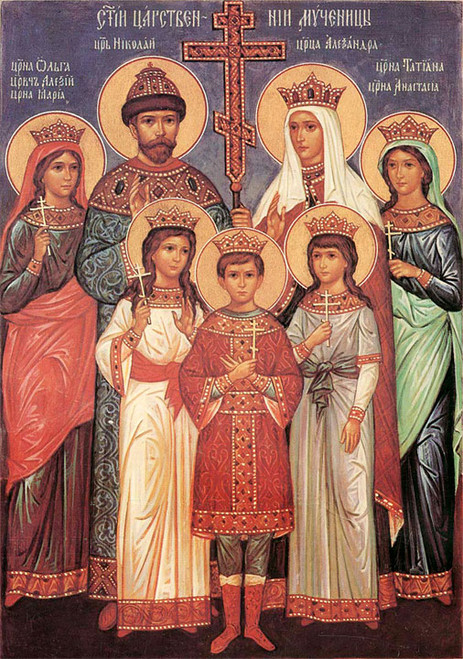
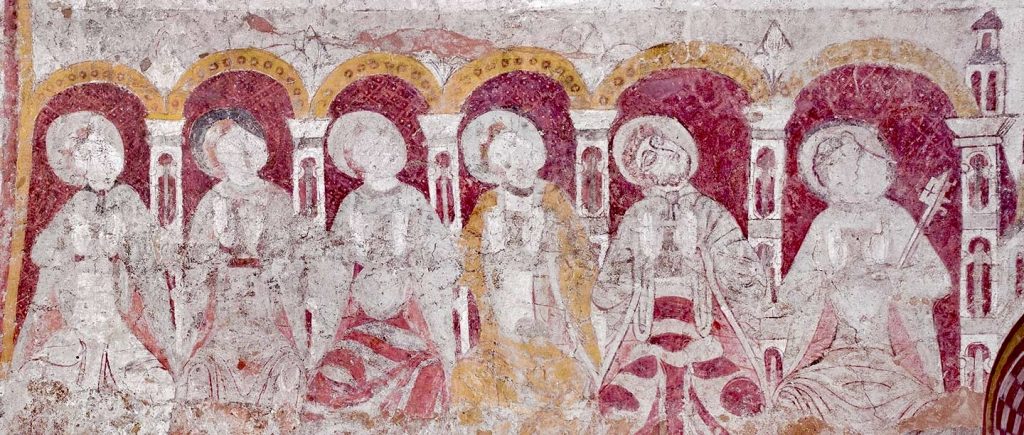
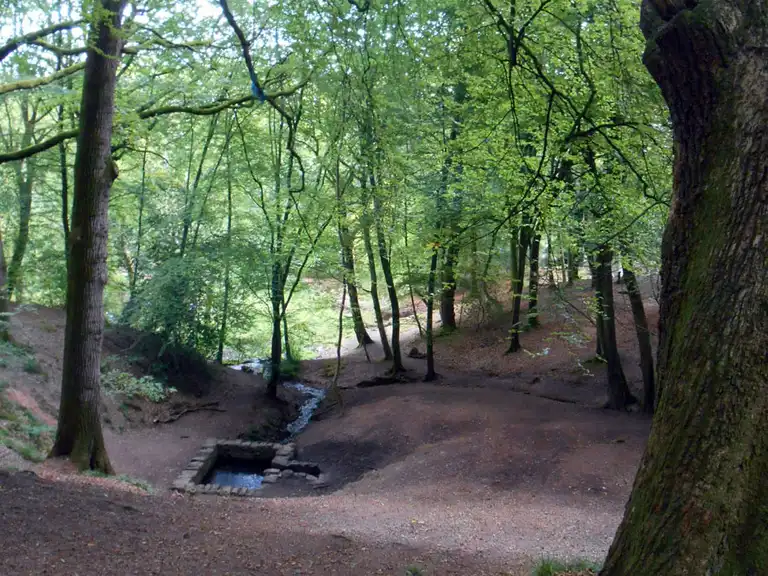
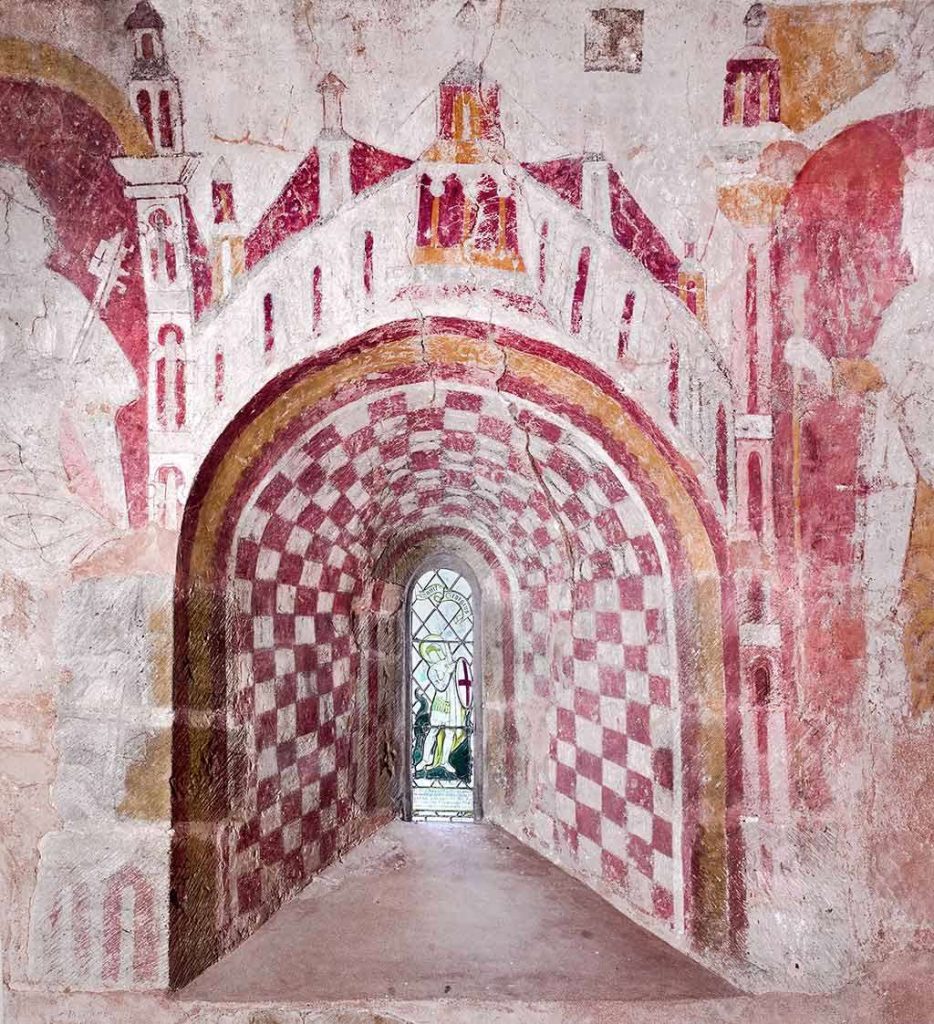
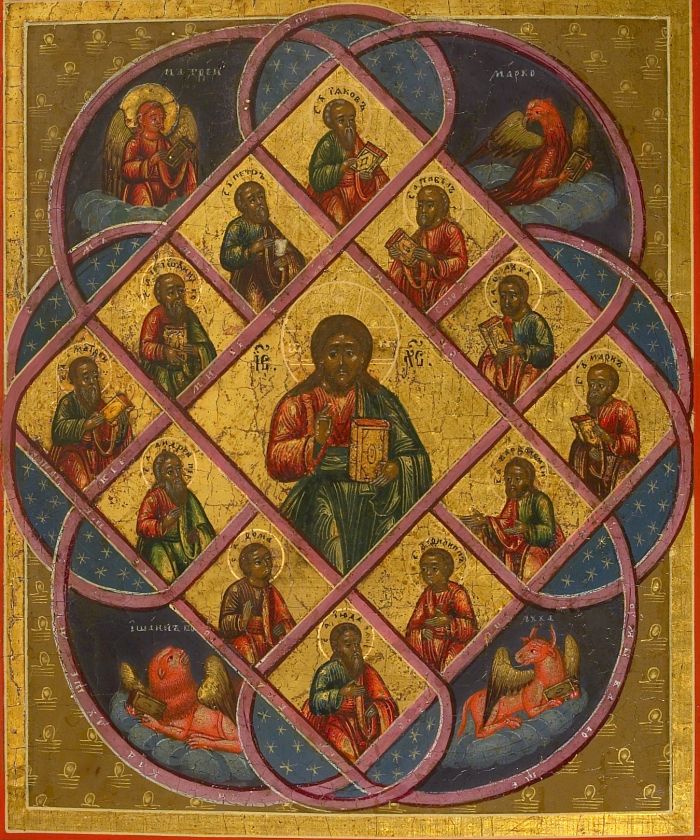
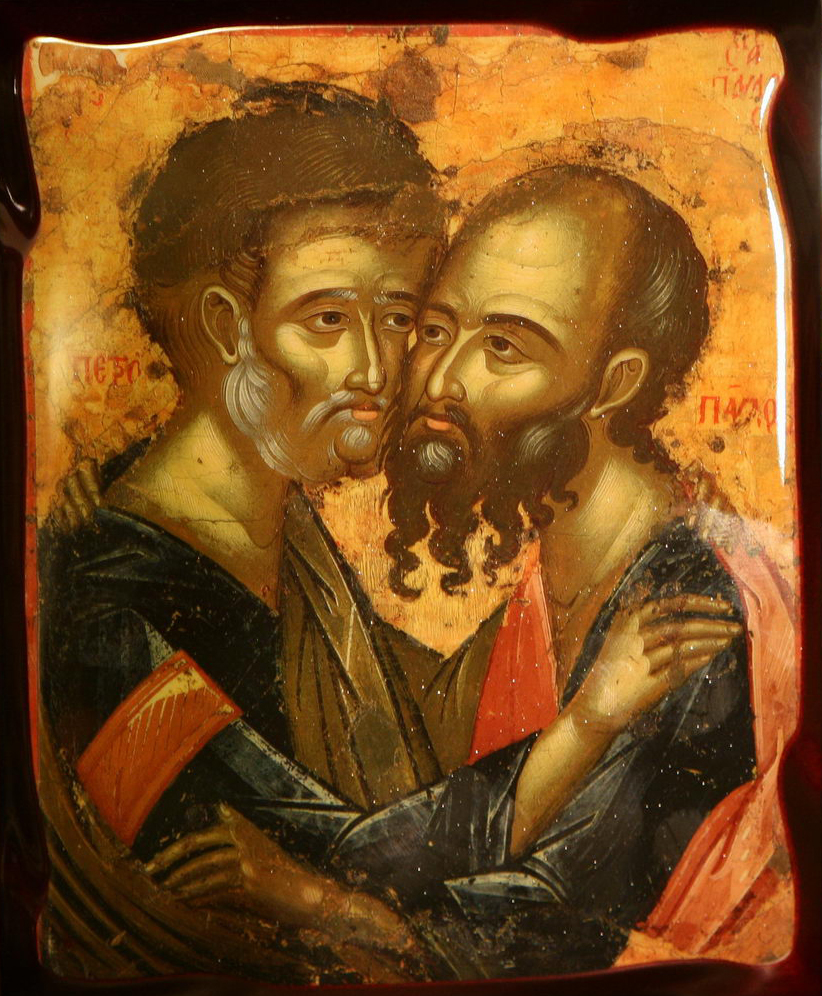
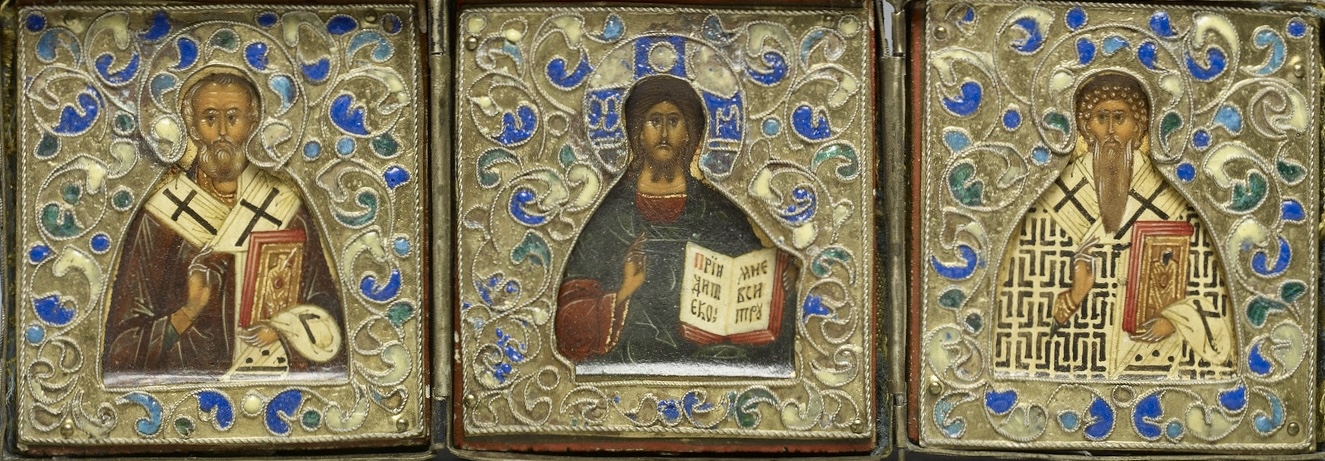
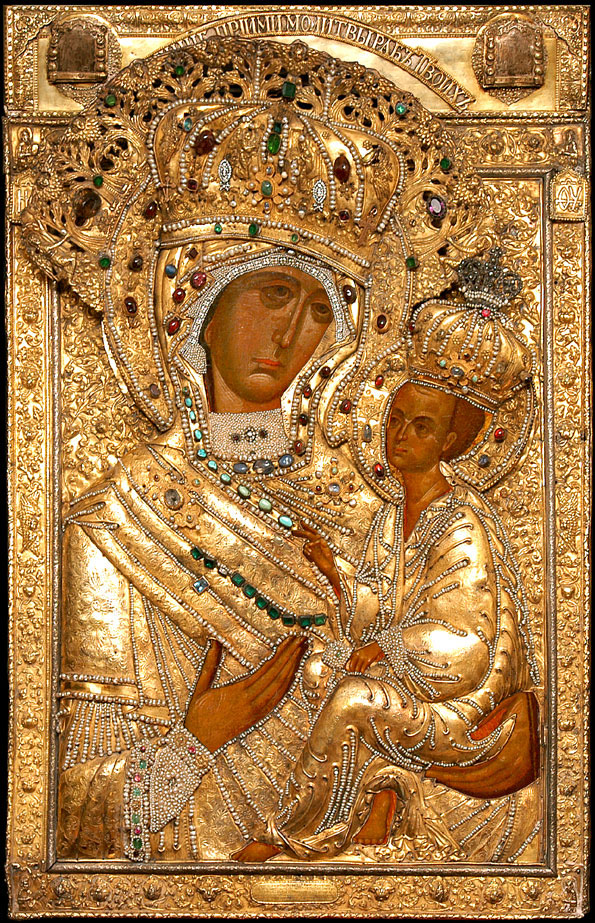
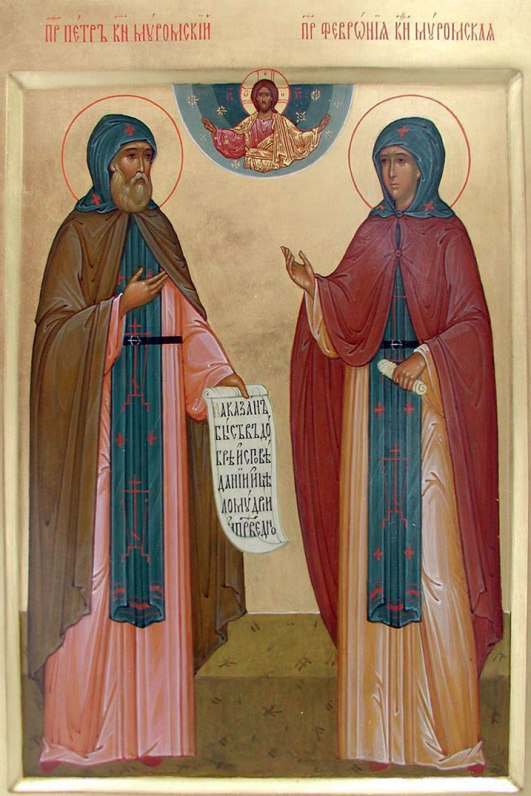
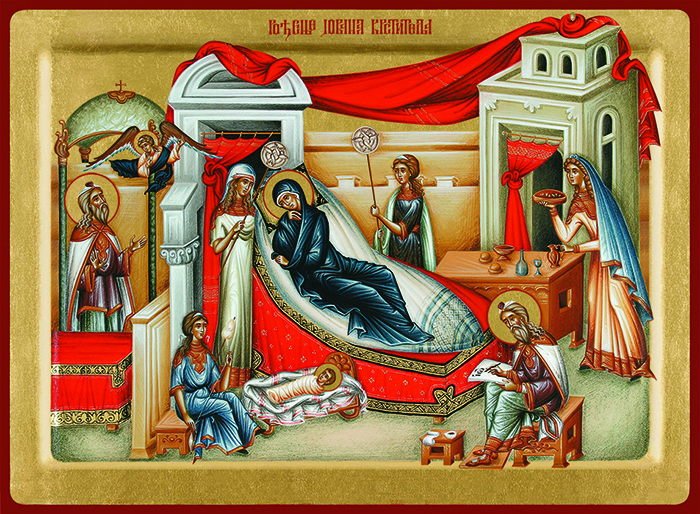 It was a joy to celebrate the feast of the Holy, Prophet, Forerunner and Baptist, John in Nazareth House today, and even though there were only a dozen of us for Liturgy, in no way did it detract from the beauty of solemnity of this feast of the birth of the first among the saints.
It was a joy to celebrate the feast of the Holy, Prophet, Forerunner and Baptist, John in Nazareth House today, and even though there were only a dozen of us for Liturgy, in no way did it detract from the beauty of solemnity of this feast of the birth of the first among the saints.